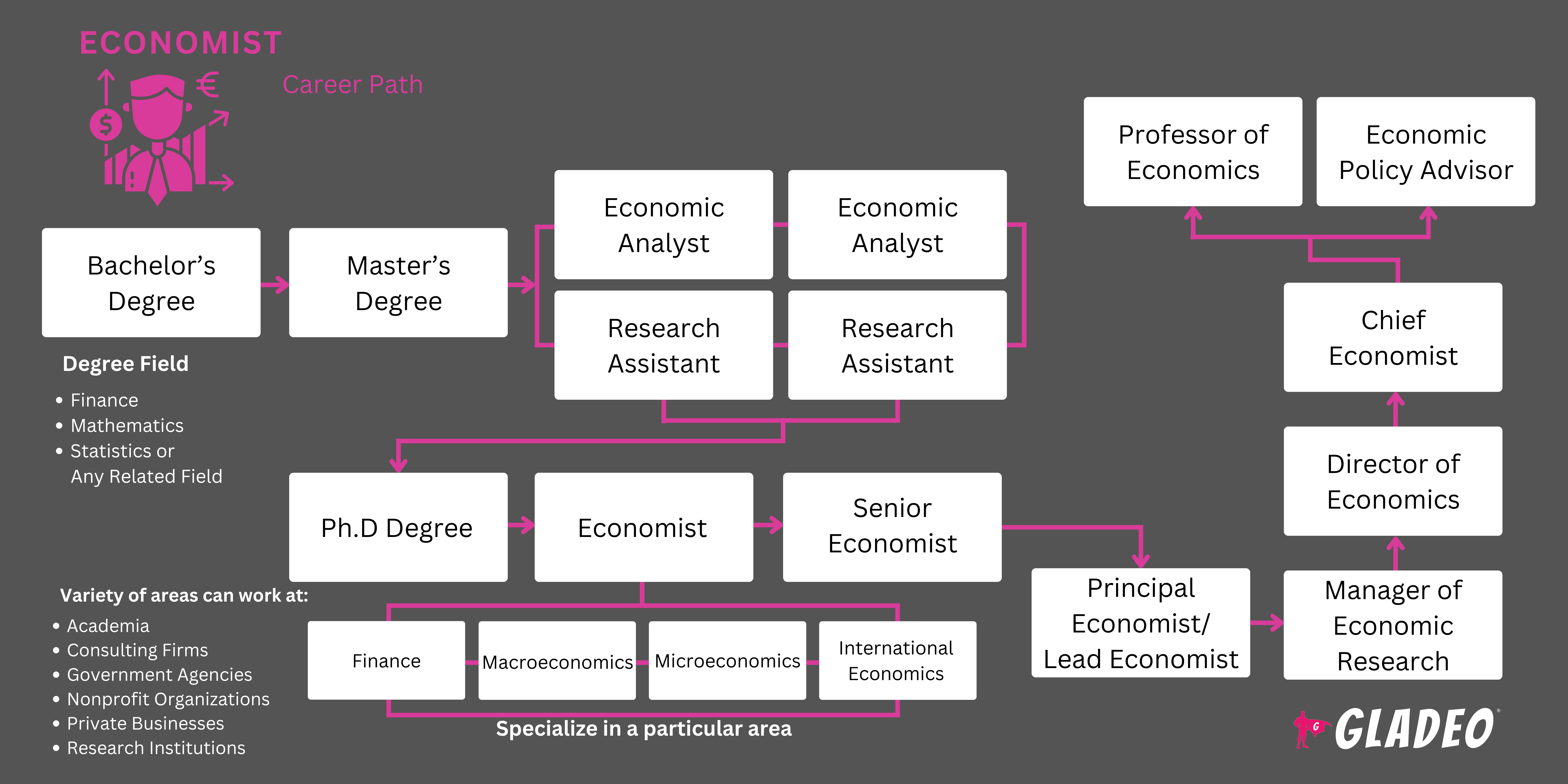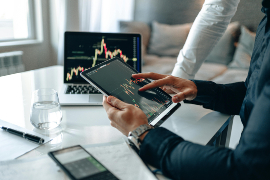Spotlights
Economic Analyst, Economic Consultant, Economic Development Specialist, Economist, Forensic Economist, Project Economist, Research Analyst, Research Associate, Revenue Research Analyst, Tax Economist
Economists study how individuals, businesses, and governments make decisions about using limited resources—time, money, and materials—to meet their needs and goals. They explore how markets function, why prices rise or fall, and how policies or events influence production, employment, and global trade. In short, Economists help explain the forces that shape our world.
At the heart of their work is data—lots of it. Economists gather information through research, surveys, and historical records, then use mathematical models and statistical tools to analyze trends. They might forecast inflation, evaluate the impact of new tax laws, study consumer spending, or advise companies on how to respond to changes in the economy.
Some Economists specialize in microeconomics, focusing on individual markets like housing, energy, or healthcare. Others work in macroeconomics, studying national or global issues such as economic growth, interest rates, and unemployment. Still others dive into niche areas such as environmental economics, behavioral economics, or data-driven economic modeling.
Economists don’t just work in government—they play key roles in finance, consulting, academia, and international organizations. Their insights guide major decisions, from how a company prices its products to how nations plan for sustainable development.
This career combines analytical precision with curiosity about human behavior. Economists are, in many ways, detectives of society—using numbers to uncover why people make the choices they do and what those choices mean for the future.
- Using research and data to solve real-world problems that affect millions of people.
- Helping shape public policy, business strategies, or environmental solutions.
- Working with complex models and emerging data technologies.
- Collaborating with smart, motivated peers in academia, government, and private sectors.
- Seeing your findings influence economic growth, employment, or sustainability.
Working Schedule
Most Economists work full-time, often in offices, research institutions, or government agencies. Some work in fast-paced environments like finance or consulting, where deadlines are tight and projects can extend beyond regular hours. Academic economists may balance teaching, research, and publishing schedules.
Typical Duties
- Gather, analyze, and interpret economic and statistical data.
- Develop mathematical models to forecast economic trends.
- Research topics such as inflation, trade, labor markets, or productivity.
- Prepare technical reports, charts, and presentations.
- Advise businesses or policymakers on financial and social outcomes.
- Evaluate the effects of policies, taxes, or regulations on the economy.
Additional Responsibilities
- Publish articles in journals or industry publications.
- Attend conferences to present research findings.
- Use data visualization software and econometric tools like Stata, R, or Python.
- Collaborate with statisticians, financial analysts, and policymakers.
- Stay current with global economic developments and trends.
An Economist’s day often begins by reviewing the latest economic reports—GDP figures, unemployment data, or market trends. Mornings might include analyzing datasets, running regression models, or updating forecasts. Afternoons are spent preparing reports, collaborating with colleagues, or briefing executives and government officials.
Some economists work on long-term projects, such as studying climate economics or international trade flows, while others handle short-term analyses for businesses. It’s an intellectually stimulating job where curiosity, precision, and communication all matter.
Soft Skills
- Critical thinking
- Problem-solving
- Analytical reasoning
- Communication and presentation
- Curiosity and persistence
- Collaboration and teamwork
- Attention to detail
- Adaptability
- Ethical judgment
Technical Skills
- Statistical and econometric analysis
- Data modeling and forecasting
- Use of software like Excel, Stata, R, Python, or SAS
- Data visualization (Tableau, Power BI)
- Understanding of micro and macroeconomic principles
- Technical writing and reporting
- Financial Economist – Studies money markets, interest rates, and banking systems.
- Labor Economist – Focuses on employment trends, wages, and workforce policies.
- Environmental Economist – Analyzes costs and benefits of environmental regulations.
- Health Economist – Examines the efficiency and cost-effectiveness of healthcare systems.
- International Economist – Researches trade, globalization, and currency exchange.
- Industrial/Business Economist – Works within companies to guide pricing, investment, or production strategies.
- Academic Economist – Conducts research and teaches at colleges or universities.
- Federal and local government agencies (e.g., Department of Finance, Bureau of Labor and Statistics)
- Central banks and financial institutions
- Research firms and think tanks
- Consulting companies
- International organizations (e.g., World Bank, IMF, UN)
- Corporations and investment firms
- Universities and policy institutes
Being an Economist can be intellectually demanding. The work often involves large amounts of data, complex statistical analysis, and long hours of reading and writing. Tight deadlines can add pressure, especially when providing forecasts that affect business or government decisions.
Some economists face stress when their models or recommendations are challenged, or when policies change unexpectedly. Research work can feel solitary at times, requiring intense concentration and patience.
However, for those who love solving puzzles, interpreting trends, and influencing decisions that affect real people, the rewards—both intellectual and societal—make it a deeply fulfilling profession.
“When people work too many hours they tend to feel deprived and they use consumption to reward themselves… even though they seem to have no money saved at the end.” — Juliet B. Schor, economist and sociologist
Economics today is evolving with technology and global challenges. One major trend is the rise of data-driven economics, where economists rely on big data, artificial intelligence, and machine learning to make faster, more accurate predictions.
There’s also growing interest in behavioral economics, which studies how psychology affects decision-making—a key tool for marketing, policy design, and consumer behavior research.
Environmental and sustainability economics are gaining importance as nations address climate change and resource management. Meanwhile, global interconnectedness means economists must now consider the impact of digital currencies, supply chain shifts, and emerging markets.
Finally, communication skills are more vital than ever. Modern economists must translate technical findings into language that decision-makers—and the public—can understand.
Future Economists often enjoyed solving puzzles, debating ideas, or exploring how systems work. They liked math, history, and current events. Many enjoyed organizing data, reading about global issues, or asking “why” and “what if” questions about money, trade, and decision-making.
- Economists typically need at least a bachelor’s degree in Economics, Mathematics, or Statistics, though many roles—especially in research or government—require a master’s or doctoral degree.
- Common course topics include:
- Microeconomics and Macroeconomics
- Econometrics and Statistical Analysis
- International Trade and Finance
- Public Policy and Fiscal Economics
- Development and Environmental Economics
- Labor and Industrial Organization
- Game Theory and Decision Science
- Mathematical Modeling
- Data Science for Economics
- Research Methods and Policy Evaluation
- Internships with financial firms, government agencies, or research institutions provide valuable real-world experience.
- Economists should also continue professional development by learning new software tools, attending conferences, and staying current with economic publications.
- Take classes in math, economics, statistics, and computer science.
- Join debate teams or model government programs to build analytical and communication skills.
- Read financial news and follow economic trends globally.
- Volunteer or intern at community organizations or local government offices.
- Learn to use data analysis tools like Excel, Python, or R.
- Join economics or investment clubs at school or college.
- Build a portfolio of research papers or analysis projects.
- Attend seminars or online lectures about global markets and public policy.
- Network with professors and mentors in economics or business departments.
- Aspiring Economists should look for programs with strong quantitative and analytical training, access to data labs, and opportunities for independent research. Accreditation and faculty with real-world experience in policy, banking, or consulting are valuable.
- Programs offering internships, co-ops, and research assistantships give students hands-on experience analyzing real data and writing reports.
Universities with strong economics programs include:
- University of Chicago – Department of Economics
- Massachusetts Institute of Technology (MIT) – School of Humanities, Arts, and Social Sciences
- Stanford University – Department of Economics
- London School of Economics and Political Science (LSE)
- University of California, Berkeley – College of Letters and Science

- Search job portals like LinkedIn, Indeed, Glassdoor, Handshake, and USAJobs.gov for entry-level economist or research assistant positions.
- Look for roles such as data analyst, research associate, or policy assistant to gain experience before applying for economist-level roles.
- Intern with government agencies, banks, think tanks, or consulting firms to develop applied skills.
- Join the American Economic Association (AEA) or local economics societies for networking and career fairs.
- Create a portfolio showcasing your data analysis, research papers, and visualization projects.
- Ask professors or internship supervisors to serve as references.
- Stay updated with economic news and be ready to discuss major trends in interviews.
- Practice explaining technical findings in clear, everyday language.
- Be open to entry-level analyst jobs—they often serve as stepping stones to economist roles.
- Earn a master’s or Ph.D. in Economics or a specialized field such as econometrics, development economics, or behavioral economics.
- Publish papers, policy briefs, or research studies in reputable academic journals or think tank publications.
- Take on research leadership roles or manage analysis teams within universities, government agencies, or private firms.
- Gain experience in a niche such as environmental, health, labor, or financial economics to build expertise and credibility.
- Attend professional conferences and present your findings to expand your network and professional reputation.
- Learn advanced modeling software and programming languages such as R, Python, SAS, or Stata.
- Build strong data visualization and communication skills to translate complex findings for decision-makers.
- Join professional organizations like the American Economic Association (AEA) or the National Association for Business Economics (NABE).
- Seek opportunities to collaborate on interdisciplinary projects involving data science, public policy, or finance.
- Consider moving into senior positions such as Chief Economist, Policy Advisor, Economic Consultant, Professor, or Research Director.
Websites
- American Economic Association (AEAweb.org)
- National Bureau of Economic Research (NBER.org)
- Bureau of Labor Statistics (bls.gov/economics)
- World Bank Open Data (data.worldbank.org)
- International Monetary Fund (IMF.org)
- Federal Reserve Economic Data (FRED.StLouisFed.org)
- O*NET OnLine
- CareerOneStop.org
- EconometricsAcademy.com
- EconomicPolicyInstitute.org
Books
- Freakonomics by Steven D. Levitt and Stephen J. Dubner
- The Undercover Economist by Tim Harford
- Naked Economics by Charles Wheelan
- Thinking, Fast and Slow by Daniel Kahneman
- Capital in the Twenty-First Century by Thomas Piketty
Economists use research and analysis to understand how the world works and help shape better decisions. If you’re interested in similar work but want to explore other options, consider:
- Financial Analyst
- Data Scientist
- Market Research Analyst
- Statistician
- Policy Analyst
- Business Consultant
- Urban or Regional Planner
- Investment Banker
Newsfeed

Featured Jobs

Online Courses and Tools








